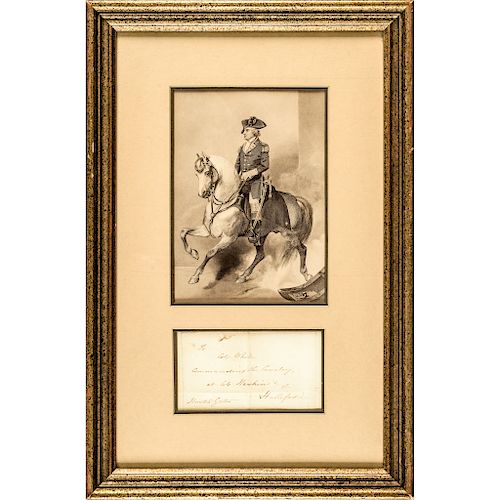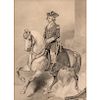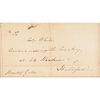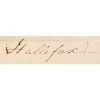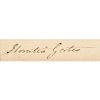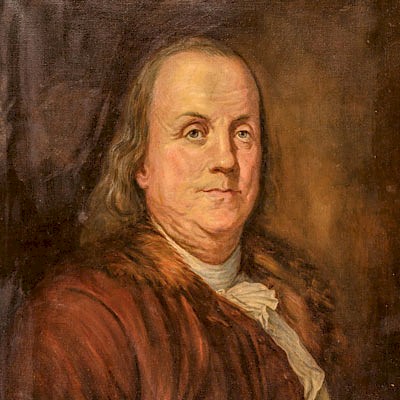c. 1780 General HORATIO GATES Signed Transmittal Envelope to Col. White Hallifax
Lot 38
Estimate:
$600 - $900
Absentee vs Live bid
Two ways to bid:
- Leave a max absentee bid and the platform will bid on your behalf up to your maximum bid during the live auction.
- Bid live during the auction and your bids will be submitted real-time to the auctioneer.
Bid Increments
| Price | Bid Increment |
|---|---|
| $0 | $10 |
| $200 | $20 |
| $300 | $25 |
| $500 | $50 |
| $1,000 | $100 |
| $2,000 | $200 |
| $3,000 | $250 |
| $5,000 | $500 |
| $10,000 | $1,000 |
| $20,000 | $2,000 |
| $30,000 | $2,500 |
| $50,000 | $5,000 |
| $100,000 | $10,000 |
| $200,000 | $20,000 |
| $300,000 | $25,000 |
| $500,000 | $50,000 |
About Auction
By Early American History Auctions
Aug 24, 2019
Set Reminder
2019-08-24 12:00:00
2019-08-24 12:00:00
America/New_York
Bidsquare
Bidsquare : Autographs, Colonial Currency, Political Americana, Historic Guns
https://www.bidsquare.com/auctions/early-american-history-auctions/autographs-colonial-currency-political-americana-historic-guns-4347
Historic Autographs • Colonial Currency • American Civil War Colonial Era • Revolutionary War • Political Americana • Black History Early American History Auctions auctions@earlyamerican.com
Historic Autographs • Colonial Currency • American Civil War Colonial Era • Revolutionary War • Political Americana • Black History Early American History Auctions auctions@earlyamerican.com
- Lot Description
Autographs
American Major General "Horatio Gates" Signed & Written Transmittal Postal Envelope Cover to "Col. White" Hallifax
HORATIO GATES (1727-1806). American Major General during the Revolutionary War who took credit for the American victory at the Battle of Saratoga only after General Benedict Arnold, who led the attack, was finally forced from the field when he was shot in the leg and was blamed for the defeat at the Battle of Camden.
c. 1780 Revolutionary War Period, Autograph Document Signed, "Horatio Gates", measuring 5" x 2.75" (by sight), Framed, Very Fine. Horatio Gates has Signed & fully written, penned in his hand, this Transmittal Postal Envelope. Gates writes, in full:
"To Col. (Colonel) White / Commanding the Cavalry, / at Col. (Colonel) Hawkins's & Halifax" (North Carolina).
Matted and framed along with a 5.25" x 7.25" Engraving of Gates on horseback to an overall size of 11.25" x 17.25". Document and engraving not examined outside of frame. Colonel Philemon Hawkins, II (1717-1801) who was a Planter, American Revolutionary War soldier, and public office holder, originally born in Virginia. He was the oldest son of Philemon and Ann Eleanor Howard Hawkins, founders of this branch of the Hawkins family in America. His parents were born in Devonshire, England, and settled in Virginia in 1715. Philemon the emigrant, the great-grandson of Sir John Hawkins, Elizabethan Naval Commander, was a young man when he died in Gloucester County, Va., in 1725. In 1735, at age 18, Hawkins moved his mother, his brother John, and his sister Ann to Bute County where he soon became the wealthiest man in the county. He was a member of the Anglican church and filled many public positions from 1743 until the end of the Revolutionary War. Hawkins took an active part in the events of 1771-76, serving as Aide-de-camp to Governor William Tryon on the expedition against the Regulators in 1771, and later as a Member of the two Provincial Congresses that met at Halifax, North Carolina in 1776.
The Congress named him a Lieutenant Colonel of Cavalry, but he soon resigned his commission to raise his own battalion. Between 1779 and 1787 he served seven terms in the General Assembly, and in 1782-83 he was a Member of the Council of State. (by Armistead Jones Maupin, 1988). A rare original Transmittal Envelope Written and Signed by General Horatio Gates when transferred to the South (June 1780), where he was disastrously defeated by Lord Cornwallis at the Battle of Camden, South Carolina, on August 16, 1780. Signed "Horatio Gates" at lower left in very clear brown ink on period laid paper, framed and ready to hang on display.
Horatio Gates, (born c. 1728, Maldon, Essex, England-died April 10, 1806, New York, New York), English-born American General in the American Revolution (1775-83) whose victory over the British at the Battle of Saratoga (1777) turned the tide of victory in behalf of the American Patriot Revolutionaries.
Horatio Gates first served in North America in the French and Indian War (1754-63), emerged as a Major, and returned to England. In 1772 he immigrated to the region that is now West Virginia. Sympathizing with colonial complaints against the British Crown, in 1775 he was made Adjutant General of the Continental Army, and in 1777 he superseded General Philip Schuyler in northern New York. In the two battles of Saratoga his army forced General John Burgoyne to surrender, partly, however, because of the previous maneuvers of Schuyler and the initiative of General Benedict Arnold.
Congress next elected Gates President of the Board of War. At the same time a group of army officers, among them General Thomas Conway, became involved in a plan to replace General George Washington with Gates. The "Conway Cabal" soon collapsed, and in the spring of 1778 Gates returned to his command in New York.
Transferred to the South (June 1780), Gates was disastrously defeated by Lord Cornwallis at the Battle of Camden, South Carolina, on August 16, 1780. An official inquiry into his conduct was ordered but charges were never pressed. After the war Gates freed his Slaves, moved to New York, and served one term in the N.Y. State Legislature.
- Shipping Info
-
Early American provides in-house worldwide shipping. Please contact us directly if you have questions about your specific shipping requirements.
-
- Buyer's Premium



 EUR
EUR CAD
CAD AUD
AUD GBP
GBP MXN
MXN HKD
HKD CNY
CNY MYR
MYR SEK
SEK SGD
SGD CHF
CHF THB
THB